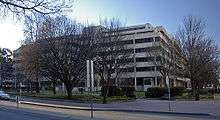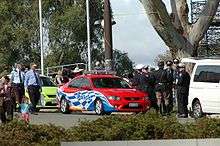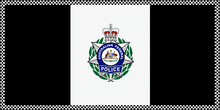Australian Federal Police
| Australian Federal Police | |
|---|---|
| Abbreviation | AFP |
|
Patch of the Australian Federal Police | |
|
Flag of the Australian Federal Police | |
| Agency overview | |
| Formed | 1979 |
| Preceding agencies |
|
| Employees | 6,598 (30 June 2008)[1] |
| Volunteers | Small numbers for non-operations related activity. |
| Annual budget | A$1.8 billion (2010-11)[2] |
| Legal personality | Governmental: Government agency |
| Jurisdictional structure | |
| Federal agency | Australia |
| Governing body | Parliament of Australia |
| Constituting instrument | Australian Federal Police Act 1979 |
| General nature |
|
| Operational structure | |
| Headquarters | Edmund Barton Building, Canberra |
| Sworn members | 2,855 (30 June 2008)[1] |
| Unsworn members | 2,402 (30 June 2008)[1] |
| Agency executive | Andrew Colvin, Commissioner |
| Functions |
9
|
| Offices |
9
|
| Website | |
| http://www.afp.gov.au/ | |
| Footnotes | |
| The Australian Federal Police, while a federal agency, provides policing to dependent Australian on and offshore Commonwealth Territories. | |

The Australian Federal Police (AFP) is the federal police agency of the Commonwealth of Australia. Although the AFP was created by the amalgamation in 1979 of three Commonwealth law enforcement agencies, it traces its history from Commonwealth law enforcement agencies dating back to the federation of Australia's six precursor British self-governing colonies in 1901.
The role of the AFP is to enforce Australian federal criminal law and to protect federal-government and national interests from crime in Australia and overseas. The AFP is Australia's international law enforcement and policing representative, and the Government's chief source of advice on policing issues.[3]
Since October 2014 the Commissioner of the Australian Federal Police has been Andrew Colvin, who succeeded Tony Negus who had been commissioner since 7 September 2009, and who was sworn in following the retirement of the previous commissioner, Mick Keelty.[4]
History
The AFP was formed on 19 October 1979 under the Australian Federal Police Act 1979[5] after the merging of the former Commonwealth Police and the Australian Capital Territory Police. This followed a review of Australia's anti-terrorism capacity by Sir Robert Mark, former Commissioner of the Metropolitan Police in the UK, which was commissioned by the Fraser Government following the 1978 Hilton bombing. In November 1979, the Federal Narcotics Bureau was transferred to the new agency.[6] In 1984 the protective service component of the AFP was separated forming the Australian Protective Service under the administrative service and later governed by Attorney-General's Department; that agency was transferred back to the AFP in 2004 and is now known as Australian Federal Police Uniform Protection.
Roles and functions
The AFP fell within the portfolio of the Home Affairs Ministry, a ministerial position outside the federal cabinet and subordinate to the Attorney-General. The minister responsible for the AFP was the Minister for Home Affairs Jason Clare, MP.[5] Before the creation of this ministerial portfolio at the start of the Rudd government in November 2007, the minister responsible for the AFP was the Minister for Justice and Customs.
Key priorities of the AFP are set by the Australian Minister for Home Affairs and Justice, through a "ministerial direction" issued under the Australian Federal Police Act 1979. The current ministerial direction was issued by then Minister for Home Affairs, Brendon O'Connor, MP, on 1 July 2010.[7]
The AFP enforces federal law and protects federal and national interests from crime in Australia and overseas. The AFP provides community policing to the Australian Capital Territory, the Jervis Bay Territory, Norfolk Island, Christmas Island and the Cocos (Keeling) Islands. The AFP provides protective security for (and on behalf of) the Australian Government.
The AFP is Australia's international law enforcement and policing representative, and is the chief adviser on policing issues to the Australian government. The AFP maintains an extensive international liaison network; officers are posted to 33 international posts. The AFP works closely and collaboratively with all Australian police forces and criminal investigative agencies and state crime commissions.
The AFP consists of a workforce of more than 6500. The Australian Federal Police Act 1979 is the legislative base for the employment of all AFP staff. Each employee is described in the legislation as an AFP employee, who are then declared as either a member (police officer, federal agent) or (uniform protection officer) – Protective Service Division. In addition, the Commissioner may appoint any person as a special member of the AFP. A special member may be given any powers and duties of an AFP member under the Act but is not regarded as a special constable.
Industrial representation of AFP staff solely rests with the Australian Federal Police Association branch of the Police Federation of Australia.
National
Federal agents are based in each Australian state and territory capital city, internationally and form the largest component of the AFP staff, federal agents chiefly perform criminal investigative duties.
Current areas of focus for the AFP:
- Illicit drug trafficking
- Organised people smuggling;
- Human Trafficking, including sexual servitude and human exploitation;
- Serious major fraud against the government
- High-tech crime involving information technology and communications
- Prevention, countering and investigation of terrorism
- Transnational and multi-jurisdictional crime
- Money laundering
- Organised crime
The AFP hosts a National Missing Persons Coordination Unit, the Australian Interpol National Central Bureau, and the Australian Bomb Data Centre.
Members of the AFP outside the ACT and other federal territory do not exercise the powers, obligations and liabilities of a constable at common law. Consequently, they are identified by each state as federal agents; that is, a member of a law enforcement agency, not a police service.
Assault rifle-armed AFP officers are situated in both chambers of the Australian Parliament as of 2015. It is the first time in Australian history that parliament has been guarded by armed personnel.[8]
Community policing role

The AFP provides community policing services to the ACT, under a contractual agreement between the Australian Government and the ACT government. This AFP portfolio, ACT Policing, is the successor of the ACT Police, one of the agencies that was merged to form the AFP in 1979. The mission of ACT Policing is to keep the peace and preserve public safety for the residents of the ACT. Key sections of ACT Policing include general duties, crime and safety management, criminal investigations, crime prevention, traffic operations and criminal intelligence. The head of ACT Policing is known as the chief police officer of the ACT.
The AFP provides community policing and counter terrorism first response duties at major Australian airports, and community policing in the Jervis Bay territory and in the external Australian territories of Norfolk Island, Christmas Island, and the Cocos Islands. The AFP provides a mix of United Nations peacekeeping, community policing and capacity development roles and services in a number of nations.
Uniform protection role

AFP uniform protection provides physical protection for the Australian government at key locations throughout Australia and internationally. Uniform protection officers are firearms and defensive tactics trained, and perform duties which include armed escorts, bomb appraisals, bomb detection canines, visitor control, static guarding, alarm monitoring and response, mobile, foot and bicycle patrols, maintain civil order, security consultancy services, counter-terrorism first response at many Commonwealth establishments. Uniform protection officers have powers under Section 14 of the AFP Act 1979 to arrest, stop, search, and request identification in their jurisdiction. Uniform protection officers undertake an essential role in protecting Australia's critical infrastructure and assist in providing protection for Australian high office holders, diplomatic, consular personnel and other foreign nationals.
Uniform protection officers providing an armed uniform capability are located at federal establishments including Parliament House in Canberra; the residences of the prime minister and governor-general; foreign embassies and consulates in Canberra, Sydney, Melbourne and Perth; the Australian Nuclear Scientific Technology Organisation installation, Joint defence facilities such as the Australian Defence Force Headquarters in Canberra, Holsworthy Barracks, Garden Island Naval Base, Victoria Barracks, the Pine Gap US defence installation, and sensitive covert locations in Australia and internationally.
International Deployment Group
Since its inception, the AFP has had a long tradition of involvement in international peacekeeping, policing and capacity development. International Deployment Group (IDG) is an AFP portfolio that has increased rapidly in a short time since its inception in 2004. Since 1964, Australia has contributed police officers to the United Nations Peacekeeping Force in Cyprus. AFP officers have also previously served with the United Nations in East Timor (Timor Leste) and South Sudan.
In recent years, Australian government efforts to assist neighbouring and remote countries with institutional capacity building has led to AFP deployments to Papua New Guinea, the Solomon Islands (Under the Regional Assistance Mission to Solomon Islands), Timor-Leste (Under the Timor-Leste Police Development Program TLPDP), Nauru, Tonga, Vanuatu, Afghanistan, Samoa and Vanuatu. Previous peacekeeping missions have included Haiti, Mozambique, Thailand, Namibia, and Somalia.
IDG uses the Specialist Response Group for particular medium and high risk planned operations or emergency incidents in addition to assisting with capacity building and force protection operations.
Ceremonial and protocol duties
To recognise, celebrate and respectfully honour the achievements and commitments made by members of the AFP, the AFP Ceremonial Team conducts and participates in a variety of police and community functions and ceremonies.
Ceremonial events include the annual National Police Remembrance Day Service at the National Police Memorial in Canberra on 29 September, medal presentations, parades, police funerals, memorial services, official opening of police stations and policing facilities, AFP pipes and drums concerts, inauguration events and public relations events
The Ceremonial Team coordinates the AFP Ceremonial and Protocol Officer (CAPO) Network, the AFP Ceremonial Mounted Cadre and the AFP Pipes and Drums to perform ceremonial duties at these functions and ceremonies.
The AFP Ceremonial Mounted Cadre was raised on 29 September 2006 at the dedication of the National Police Memorial. The ceremonial uniform comprises linkages to former mounted policing units of the AFP's predecessor organisations, namely the Commonwealth Police and the Peace Officer guard, as well as mounted policing units from the NSW Police Force which patrolled the geographic area of the ACT.
The AFP Ceremonial and Protocol team currently provide drill instructor accreditation for both the AFP and the NSW Police Force, and ceremonial and protocol officer accreditation for all of Australia's policing jurisdictions.
International network
The AFP has an international network to assist with inquiries and liaison with police agencies around the world. The AFP represents Australian state/ territory police agencies internationally. AFP's International Liaison Officer Network has 85 AFP appointees in 30 countries around the world. AFP International Liaison Officers are the Australian Government's law enforcement representatives overseas.[9]
Commissioners since 1979
The senior AFP officer is the Commissioner of Police, appointed under Section 17 of the Australian Federal Police Act 1979.
| Period | Name | Post- Nominals |
|---|---|---|
| 1979–1982 | Sir Colin Woods | KCVO CBE QPM |
| 1983–1988 | Major General Ron Grey | AO DSO |
| 1988–1994 | Peter McAulay | AO QPM |
| 1994–2001 | Mick Palmer | AO APM |
| 2 April 2001 – 2 September 2009 | Mick Keelty | AO APM |
| 7 September 2009 – 30 September 2014 | Tony Negus | APM |
| 1 October 2014 – current | Andrew Colvin | OAM APM |
Titles and ranks
AFP members performing duties in ACT Policing, External Territories, Aviation, International Deployment Group (mission component) use uniform and community policing ranks. All other members use the title Federal Agent. Where applicable qualified members are also entitled to use Detective designation.
AFP Commissioner's Order 1 (Administration) states that every AFP Member holds a rank (as detailed below), with the corresponding title and role adopted.
Police ranks
| Uniform and Community Policing Rank/Title | Broadband Rank | Role | National Operations Title |
|---|---|---|---|
| Constable/First Constable/Senior Constable/Leading Senior Constable | Constable | Team Member | Federal Agent, Team Member |
| Sergeant/Station Sergeant | Sergeant | Team Leader | Federal Agent, Team Leader |
| Superintendent | Superintendent | Coordinator | Federal Agent, Coordinator |
| Commander | Commander | Manager | Commander, Manager |
| Assistant Commissioner | Assistant Commissioner | National Manager | Assistant Commissioner, National Manager |
| Deputy Commissioner | Deputy Commissioner | Deputy Commissioner | Deputy Commissioner |
| Commissioner | Commissioner | Commissioner | Commissioner |
First Constable is a reflection of four years of service as a Member. Senior Constable is a reflection of six years of service as a Member
Uniform Protection officer ranks
Uniform Protection officers hold the following ranks:
Protective Service Officer/Protective Service Officer Grade 1/Protective Service Officer Grade 2/Senior Protective Service Officer
Protective Service Sergeant
Protective Service Superintendent
| Constable | Senior Constable | Sergeant |
 |  |  |
Criticisms
Haneef Affair
On 2 July 2007 Muhamed Haneef was arrested and held by the AFP for terror-related incidents. It was the longest detention without charge under recent anti-terror laws and was found to be unjustified.
Martens Conviction
In October 2006 a Cairns jury convicted pilot Frederic Arthur Martens under sex tourism laws of having intercourse with a 14-year-old girl in Port Moresby, Papua New Guinea. However, Martins was not in Port Moresby at the time, and flight records could prove this. The AFP refused to retrieve those records despite numerous requests, and Martins could not retrieve them as he was in jail. When the records were eventually retrieved by Martins' partner the convictions were quashed, with strong criticism of the AFP by Justice Chesterman. The AFP also froze all of Martin's funds while he was in custody, which prevented treatment for his daughter in Port Moresby who died as a result.[10]
The Bali Nine
The AFP were contacted by a member of the Bali Nine drug courier gang's father, and they said they would keep a watch on him. They could not stop them traveling to Indonesia to smuggle drugs. Instead, they contacted the Indonesian Police which led to their arrest in Indonesia rather than when returning to Australia. The leaders of the gang Andrew Chan and Myuran Sukumaran were executed on 29 April 2015. [11]
Harun Causevic
Over 200 heavily armed police conducted raids at 3am at various houses in Victoria on 19 April 2015, and then held Harun Causevic on a Preventative Detention Order (PDO), before charging him with terrorist offences. [12] Victorian premier Daniel Andrews said this was the first time a PDO had been used, and validated their importance. [13]
However, after Causevic spent three months in jail awaiting trial the federal police decided to drop the terrorism charges. [14] Causevic's defense lawyer, Rob Stary, said there was never any real evidence against Causevic, and that this eroded confidence in the authorities. He was also critical of the earlier "grandstanding" of Prime Minister Tony Abbott and Premier Daniel Andrews. [15]
Australian Federal Police College
Australian Federal Police College is the training facility for the force.
The college's residential area was home to then Prime Minister Tony Abbott when he was in Canberra as the Lodge was undergoing renovations.[16]
See also
- AFP: Australian Federal Police (TV Series)
- Australian Protective Service (Obsolete)
- CrimTrac
- Federal police
- List of Australian Federal Police killed in the line of duty
- Specialist Response Group, the Police Tactical Group of the AFP
- Commonwealth Police
- Australian Capital Territory Police
- Australian Federal Police Association
Issues:
Similar agencies in other nations
Austria
Brazil
Canada
Germany
Ireland
New Zealand
Russia
South Africa
Spain
UK:
USA
References
- 1 2 3 "Archived copy" (PDF). Archived from the original (PDF) on 10 July 2009. Retrieved 2011-03-31. Australian Federal Police Annual Report 2007–08 Appendix 4
- ↑ "Archived copy" (PDF). Archived from the original (PDF) on 26 December 2010. Retrieved 2011-01-28. Australian Federal Police Budget Report 2010–11
- ↑ "Archived copy". Archived from the original on 3 September 2009. Retrieved 2009-09-01. Our organisation
- ↑ Negus to be sworn in as top cop, Australian Broadcasting Corporation, 7 September 2009.
- 1 2 AFP governance framework Archived 29 August 2007 at the Wayback Machine.
- ↑ National Archives of Australia, Documenting a Democracy, Australian Government, archived from the original on 16 July 2005
- ↑ "Archived copy". Archived from the original on 21 October 2009. Retrieved 2009-09-01.
- ↑ Armed guards are now stationed to protect Australian MPs and senators in both chambers of federal parliament: SMH 9 February 2015
- ↑ http://www.afp.gov.au/policing/international-liaison/international-network.aspx.
- ↑ Frederic Martens Case
- ↑ "Bali nine executions: AFP defends its role in arrests".
- ↑ "Victorian police granted order to hold man without charge following Melbourne raids".
- ↑ "http://www.theguardian.com/australia-news/2015/apr/20/victoria-police-defend-force-used-during-terrorist-raids-despite-claims-of-injury". External link in
|title=(help) - ↑ "Federal police drop Anzac Day terrorism charges against Harun Causevic".
- ↑ "'Terrible injustice': Lawyer calls for apology for teen terror accused Harun Causevic".
- ↑ http://www.smh.com.au/federal-politics/political-news/tony-abbott-opts-for-modest-lodgings-20130915-2tsfw.html
External links
| Wikimedia Commons has media related to Australian Federal Police. |
- Australian Federal Police
- Australian Federal Police Commissioner, Canberra
- Australian Federal Police Act 1979
- ACT Policing

